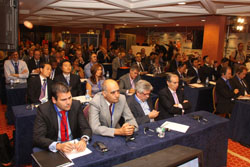The Mercas network generate a turnover of over 10,000 million euros per year
15 September 2010 |

- In the Mercas operate 2,600 wholesale companies, which sell to more than 50,000 customers in all the food-chain, with a turnover of over 10,000 Million euros per year
- The Mercas Network commercializes in the wholesale level 50% of the fresh products consumed in Spain, and its area of influence covers 86% of the population
- The public service provided by the Mercas fulfills a significant and efficient social function within the current model of the food-chain
- Mercas have been able to adapt to the changes experienced by the distribution chains, and they face now new challenges for achieving a more efficient and competitive management in social, financial and environmental terms
The Red de Mercas (the Wholesale Markets network), is made up by a total of 23 food units, generates a turnover of over 10,000 Million euros per year, while at the same time it commercializes around 50% of the fresh foodstuffs at the wholesale level out of total consumption of fresh foodstuffs (both at home and outside), which represents around 55% of household consumption.
The above was stated by the Head of the Logistical and Trade Distribution Area of the Instituto Cerdá, Mr. Roger Gaspa Maynou, during his address at the Conference of the World Union of Wholesale Markets which is taking place between 14th and 17th of September in Palma de Mallorca, and in which are present more than 200 markets from 50 countries.
In his address 'Positioning of Red Mercasa in the food-chain', he highlighted that the public service provided by Mercas fulfills a significant and efficient role within the current model of food-chain, making possible and promoting the existence and maintenance of retail commercial models (specialized retail shops and municipal markets, basically). 'Mercas have been able to adapt to the changes in the distribution systems, and they have generated new business models, as for instance, the organized retail distribution', he stated.
As for Mercas growth, and especially of the Central Markets, Mr. Gaspa explained that this is a factor which is determined by different issues, such as the proximity and the potential demand in their influence area; the competition within their influence area; the existence of a critical mass of operators within the Merca for generating economies of facility, and the size of the operators within the Merca.
Besides, steps have been taken to guarantee that Mercas can be able to generate between 15% and 25% more in economies of facility, opportunity and scale than other food centers.
According to Mr. Gaspa, there are a number of threats which affect the competition positioning of the Mercas Network, as are the increase in the concentration in origin and the sale in the origin to the retail channel; the vertical integration processes within the chain, which in many cases take place outside the Mercas; the apparition of short distribution chains and channels, which work directly from origin to destination; the increase in the channels transparency, and the growing accessibility to the offer and the growing role of the internet and IT channels.
'The improvement of the value-added services aimed at the customers, as well as the improvement of the facilities and services aimed at the wholesaler, or the promotion of the number of added-value deals, are some of the most important challenges to the model of the Mercas Network', concluded Mr. Gaspa.
The challenge of sustainability
Other of the most significant issues discussed during the first day of the Conference of the World Union of Wholesale Markets (WUWM) has been the management of the Environment of the wholesale markets.
In this regard, the Manager in charge of the Management Area in the Seoul Market, in South Korea, Mr. Joon-shik, pointed out that the main goal of the environmental management is to achieve an environmentally friendly wholesale market. A green market can only be achieved through low carbon emissions, he explained, through 5 important factors, as are concentrating the cutting-edge environmental facilities underground; an efficient waste-collection system; waste recycling and the treatment of waste water. 'In this way, it will be possible to create a space which is open to the community'.
The Manager in charge of Commercial Structures at Mercasa, Mr. David Chica, in his presentation titled 'The Sustainability Challenge' highlighted that the main objective is progressing from 3 basic questions: How much raw materials we consume?; How much waste we generate?; How much we pollute? Only in this way, he explained, will we arrive to the final question; Are we efficient?, and not only from the financial standpoint, but also from the environmental perspective. 'The Agenda of the wholesale markets must include the idea that the improvement of the environment means savings in all senses', he stressed.
'The commitment with the Environment is a duty which must be more and more important, because this is what Society is demanding. This is why wholesale markets must go ahead of social demands. To progress in sustainability and social responsibility is a duty with Society and with the planet', he concluded.
The World Union of Wholesale Markets (WUWM) is a non-profit association that aims to promote the international exchange of information on wholesale and retail markets, with a view to improving their construction, organization and management. An international projection which is reinforced thanks to Mercasa's and the Mercas Network active participation in the WUWM.







